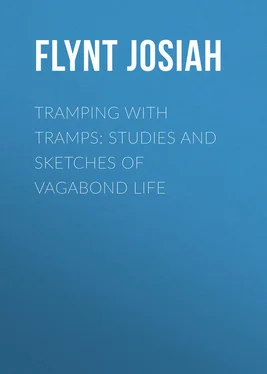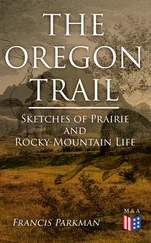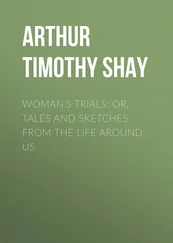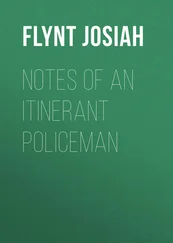Josiah Flynt - Tramping with Tramps - Studies and Sketches of Vagabond Life
Здесь есть возможность читать онлайн «Josiah Flynt - Tramping with Tramps - Studies and Sketches of Vagabond Life» — ознакомительный отрывок электронной книги совершенно бесплатно, а после прочтения отрывка купить полную версию. В некоторых случаях можно слушать аудио, скачать через торрент в формате fb2 и присутствует краткое содержание. Жанр: foreign_antique, foreign_prose, на английском языке. Описание произведения, (предисловие) а так же отзывы посетителей доступны на портале библиотеки ЛибКат.
- Название:Tramping with Tramps: Studies and Sketches of Vagabond Life
- Автор:
- Жанр:
- Год:неизвестен
- ISBN:нет данных
- Рейтинг книги:3 / 5. Голосов: 1
-
Избранное:Добавить в избранное
- Отзывы:
-
Ваша оценка:
- 60
- 1
- 2
- 3
- 4
- 5
Tramping with Tramps: Studies and Sketches of Vagabond Life: краткое содержание, описание и аннотация
Предлагаем к чтению аннотацию, описание, краткое содержание или предисловие (зависит от того, что написал сам автор книги «Tramping with Tramps: Studies and Sketches of Vagabond Life»). Если вы не нашли необходимую информацию о книге — напишите в комментариях, мы постараемся отыскать её.
Tramping with Tramps: Studies and Sketches of Vagabond Life — читать онлайн ознакомительный отрывок
Ниже представлен текст книги, разбитый по страницам. Система сохранения места последней прочитанной страницы, позволяет с удобством читать онлайн бесплатно книгу «Tramping with Tramps: Studies and Sketches of Vagabond Life», без необходимости каждый раз заново искать на чём Вы остановились. Поставьте закладку, и сможете в любой момент перейти на страницу, на которой закончили чтение.
Интервал:
Закладка:
II
THE CHILDREN OF THE ROAD
I
The real "road" is variously named and variously described. By the "ambulanter" it is called Gipsyland, by the tramp Hoboland; the fallen woman thinks it is the street, the thief, that it means stealing and the penitentiary; even the little boy who reads dime novels and fights hitching-posts for desperados believes momentarily that he too is on the real road. All these are indeed branches of the main line. The road proper, or "the turf," as the people who toil along its stretches sometimes prefer to call it, is low life in general. It winds its way through dark alleys and courts to dives and slums, and wherever criminals, hoboes, outcast women, stray and truant children congregate; but it never leads to the smiling windows and doorways of a happy home, except for plunder and crime. There is not a town in the land that it does not touch, and there are but few hamlets that have not sent out at least one adventurer to explore its twists and turnings.
The travelers, as I have said, are of all kinds, conditions, and ages: some old and crippled, some still in their prime, and others just beginning life. To watch in thought the long and motley procession marching along is to see a panorama of all the sins, sorrows, and accidents known to human experience. Year after year they trudge on and on, and always on, seeking a goal which they never seem to find. Occasionally they halt for a while at some half-way house, where they have heard that there is a resting-place of their desire; but it invariably proves disappointing, and the tramp, tramp, tramp begins afresh. Young and old, man and woman, boy and girl, all go on together; and as one dies or wearies of the march, another steps into his heel-tracks, and the ranks close up as solidly as ever.
The children of the road have always been to me its most pitiful investiture, and I have more than once had dreams and plans that looked to the rescue of these prematurely outcast beings. It needs skilled philanthropists and penologists, however, for such a work, and I must content myself with contributing experiences and facts which may perhaps aid in the formation of theory, and thus throw light upon the practical social tasks that are before us.
There are four distinct ways by which boys and girls get upon the road: some are born there, some are driven there, others are enticed there, and still others go there voluntarily.
Of those who are born on the road, perhaps the least known are the children of the ambulanters. The name is a tramp invention, and not popular among the ambulanters themselves. They prefer to be called gipsies, and try at times, especially when compelled by law to give some account of themselves, to trace their origin to Egypt; but the most of them, I fear, are degenerated Americans. How they have become so is a question which permits of much conjecture, and in giving my own explanation I do not want it to be taken as applicable to the entire class. I know only about fifty families, and not more than half of these at all familiarly; but those whom I do know seem to me to be the victims of a pure and simple laziness handed down from generation to generation until it has become a chronic family disease. From what they have told me confidentially about their natural history, I picture their forefathers as harmless village "do-nothings," who lounged in corner groceries, hung about taverns, and followed the fire-engine and the circus. The second generation was probably too numerous for the home parish, and, inheriting the talent for loafing, started out to find roomier lounges. It must have wandered far and long, for upon the third generation, the one that I know, the love of roaming descended to such a degree that all North America is none too large for it. Go where one will, in the most dismal woods, the darkest lanes, or on the widest prairies, there the ambulanter may be found tenting with his large and unkempt family. He comes and goes as his restless spirit dictates, and the horse and wagon carry him from State to State.
It is in Illinois that I know his family best. Cavalier John, as he proudly called himself, I remember particularly. He gave me shelter one night in his wagon, as I was toiling along the highway south of Ottawa, and we became such good friends that I traveled with his caravan for three days. And what a caravan it was! A negro wife, five little mulattoes, a deformed white girl, three starved dogs, a sore-eyed cat, a blasphemous parrot, a squeaking squirrel, a bony horse, and a canvas-topped wagon, and all were headed "Texas way." John came from Maine originally, but he had picked up his wife in the West, and it was through their united efforts in trickery and clever trading that they had acquired their outfit. So far as I could learn, neither of them had ever done an honest stroke of business. The children ranged from three years to fourteen, and the deformed girl was nearly twenty. John found her among some other ambulanters in Ohio, and, thinking that he might make money out of her physical monstrosities as "side-shows," cruelly traded off an old fox for her. She ought to have been in an insane asylum, and I hope John has put her there long ago. The other "kidlets," as they were nicknamed, were as deformed morally as was the adopted girl physically. They had to beg in every town and village they came to, and at night their father took the two oldest with him in his raids on the hen-roosts. It was at town and county fairs, however, that they were the most profitable. Three knew how to pick pockets, and the two youngest gave acrobatic exhibitions. None of them had ever been in school, none could read or write, and the only language they spoke was the one of their class. I have never been able to learn it well, but it is a mixture of Rom and tramp dialects with a dash of English slang.
On the journey we met another caravan, bound West by way of Chicago. There were two families, and the children numbered sixteen; the oldest ranging from fifteen to twenty, and the youngest had just appeared. We camped together in a wood for a night and a day, and seldom have I sojourned in such company. John had given me a place with him in the wagon, but now the woman with the babe was given the wagon, and John and I slept, or tried to, "in the open." In the other wagon, both sexes, young and old, were crowded into a space not much larger than the ordinary omnibus, and the vermin would have made sleep impossible to any other order of beings. The next day, being Sunday, was given over to play and revel, and the poor horses had a respite from their sorrows. The children invented a queer sort of game, something like "shinny," and used a dried-up cat's head as block. They kicked, pounded, scratched, and cursed one another; but when the play was over all was well again, and the block was tucked away in the wagon for further use. Late at night the journeys were taken up once more, one caravan moving on toward Dakota, and the other toward the Gulf.
"Salawakkee!" 1 1 So long.
cried John, as he drove away; and the strangers cried back, "Chalamu!" 2 2 Live well.
I wonder what has become of that little baby for whom I sat the night out? It is over ten years ago now, and he has probably long since been compelled to play his part in crime, and scratch and fight as his older brothers and sisters did on that autumn Sunday morning. Certainly there is nowhere in the world a more ferocious set of children than these of the ambulanters. From morning till night it is one continual snap and bite, and the depraved fathers and mothers look on and grin. They have not the faintest ideal of home, and their only outlook in life is some day to have a "rig" of their own and prowl throughout the land, seeking whom they may devour. To tame them is a task requiring almost divine patience. I should not know how to get at them. They laugh at tenderness, never say "Thank you," and obey their parents only when driven with boot and whip. I wish that I could suggest some gentle method by which they could be rescued from the road and made good men and women. It always seems harsh to apply strict law to delinquents so young and practically innocent, but it is the only remedy I can offer. They must be put under stiff rule and order, and trained strictly and long. Although lacking gipsy blood, they have acquired gipsy character, and it will take generations to get it out of them. Just how many children are born on the road is a question which even the ambulanter would find difficult to answer. They are scattered so widely and in such out-of-the-way places that a census is almost impossible. In the families that I have met there have never been less than four children. Gipsy Sam once told me that he believed there were at least two hundred ambulanter families in the United States, but this will strike every one as a low estimate; however, if this is true, and each family has as many boys and girls as those that I have met, then there must be at least a thousand of their kind.
Читать дальшеИнтервал:
Закладка:
Похожие книги на «Tramping with Tramps: Studies and Sketches of Vagabond Life»
Представляем Вашему вниманию похожие книги на «Tramping with Tramps: Studies and Sketches of Vagabond Life» списком для выбора. Мы отобрали схожую по названию и смыслу литературу в надежде предоставить читателям больше вариантов отыскать новые, интересные, ещё непрочитанные произведения.
Обсуждение, отзывы о книге «Tramping with Tramps: Studies and Sketches of Vagabond Life» и просто собственные мнения читателей. Оставьте ваши комментарии, напишите, что Вы думаете о произведении, его смысле или главных героях. Укажите что конкретно понравилось, а что нет, и почему Вы так считаете.












